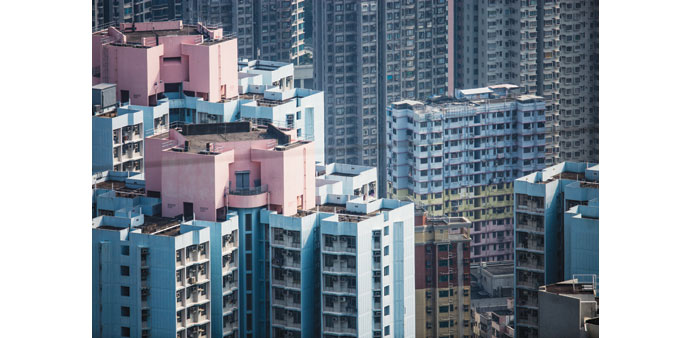Residential buildings are seen in the Wong Tai Sin district of Hong Kong. As long as the property market cools rather than crashes, there’s plenty of room for stocks to rally, says Jonas Kan, an analyst at Daiwa Securities.
Bloomberg
Hong Kong
These days, Jonas Kan divides his time between forecasting how far Hong Kong property prices will fall, and how much real estate stocks will rise.
While home prices are poised to fall as much as 10% by the middle of 2016, Kan reckons, publicly-traded shares have baked that in and more. The analyst at Daiwa Securities Group’s Hong Kong unit sees the stocks rallying at least 20% over the next year. With Sun Hung Kai Properties and its peers all trading at valuations below the global average, Kan says as long as the property market cools rather than crashes, there’s plenty of room for stocks to rally.
“This kind of discount you can’t find anywhere in global property,” said Kan, whose calls over the past three months delivered almost twice the gains of the average strategist tracked by Bloomberg. “In the past, when the actual decline in prices turned out not as large as the stock market has discounted, share prices usually do quite well after that.”
He’s not the only analyst who’s bullish: price targets compiled by Bloomberg imply a 23% average rally for Hong Kong’s biggest developers and landlords in the next year.
That’s with Bocom International Holdings Co, Barclays and CLSA all forecasting a slump in residential prices amid concern about higher mortgage rates, increasing supply and China’s economic slowdown.
The city’s nine biggest real estate shares slid an average 8.4% in 2015 through Wednesday, with Wharf Holdings leading declines. Cheung Kong Property Holdings, which spun off in June, is down 30% since then. A measure of property companies on the Hang Seng Index pared its gains to 0.2% at the close from 2%, with Sino Land Co and Wharf leading the advance. Hong Kong’s benchmark index slipped less than 0.1%.
Investors have overreacted to fears of a plunge in home prices before, according to Kan. In 2013, the city’s property stocks tumbled amid government efforts to curb house-price growth and as global financial markets braced for a reduction in stimulus from the Federal Reserve.
The Hang Seng Properties Index climbed 7.2% the following year as home-price declines projected by a long list of brokerages never materialised.
Bocom said November 17 it sees house prices dropping as much as 20% in the next three to six months, while property adviser Colliers International predicts a 15% slide next year. There’s a 74% chance that the Federal Reserve will increase rates in December, according to futures data compiled by Bloomberg. With Hong Kong’s currency pegged to the dollar, borrowing costs in the market track US rates.
“If it turns out the magnitude of correction is not as severe or doesn’t last for that long, there will be an impact on share prices,” said Kan. “They can move quite quickly.”
Sam Le Cornu, who oversees about $3bn in Asian equities at Macquarie Investment Management, says investors are right to be cautious. The city’s property prices have more than doubled since 2008 to become the world’s most unaffordable, according to UBS Group. Supply is increasing, with the government projecting 86,000 units of housing to be available for sale in the next three to four years, and lawmakers have imposed restrictions including a purchase tax on non-residents.
“The demand side has peaked,” said Le Cornu. “Buyers from mainland China aren’t buying it in the same volumes as they previously were.”
Secondary private residential property prices dropped 3.9% since peaking in September, according to an index published by broker Centaline Property Agency Ltd Mortgage loans approved in September slid by 12.3% from the previous month to HK$21.1bn, its third monthly decline, according to the Hong Kong Monetary Authority. Transactions are also declining, while the city’s home sellers at major estates are starting to cut prices, the Hong Kong Economic Times reported.
Hong Kong’s real estate companies trade at an average 6.9 times reported earnings, compared with 9.9 times for the Hang Seng Index and 11.9 times for the Bloomberg World Real Estate Index.
“Although we are negative on the physical market outlook given the increased supply and high home prices, we remain positive on Hong Kong property stocks,” Barclays analyst Paul Louie wrote in a report this month. “The current valuation implied by stock prices already factor in a 12 to 23% asset price correction; we see scope for share prices to strengthen.”
Morgan Stanley says attractive valuations are a reason to buy stocks including Cheung Kong Property, Wharf Holdings and Sun Hung Kai Properties, despite the analysts’ view that home prices and retail rents are likely to fall.
“The outlook is not that positive because of the interest- rate hike, increase in supply and recent price cutting, giving an impression that correction is in progress,” said Ben Kwong, a director at brokerage KGI Asia. “But it all depends on the share price. If they are down a lot and investors believe they already discounted a lot, they’re going to be bargain hunting.”

